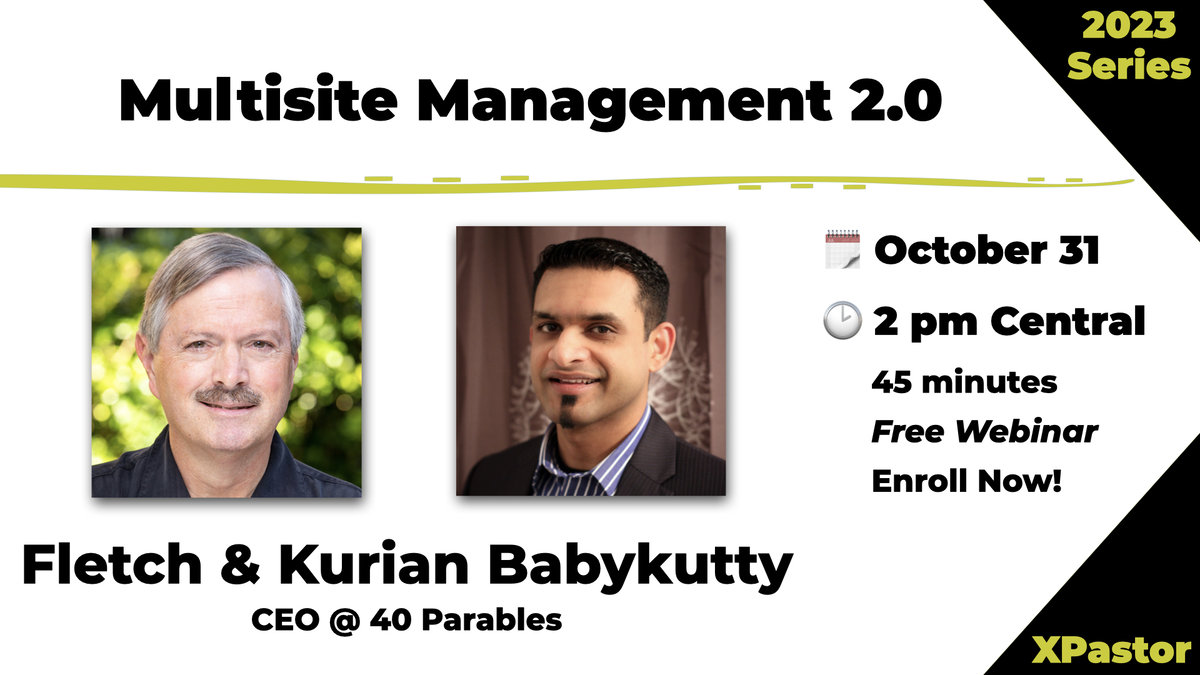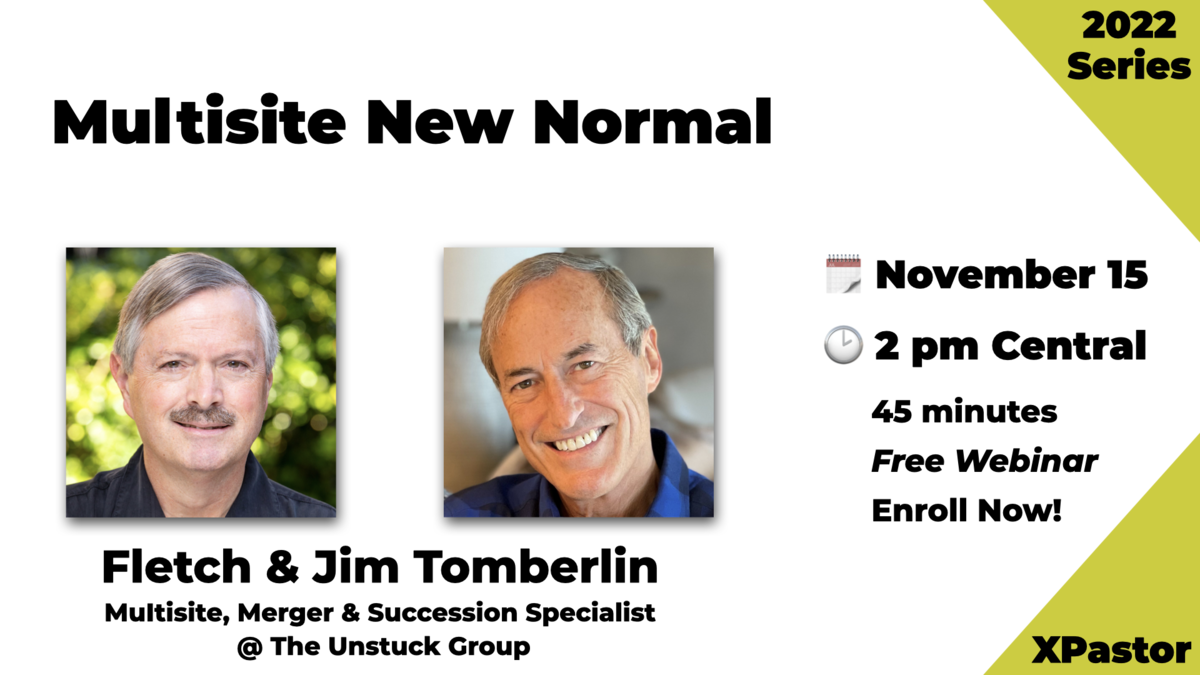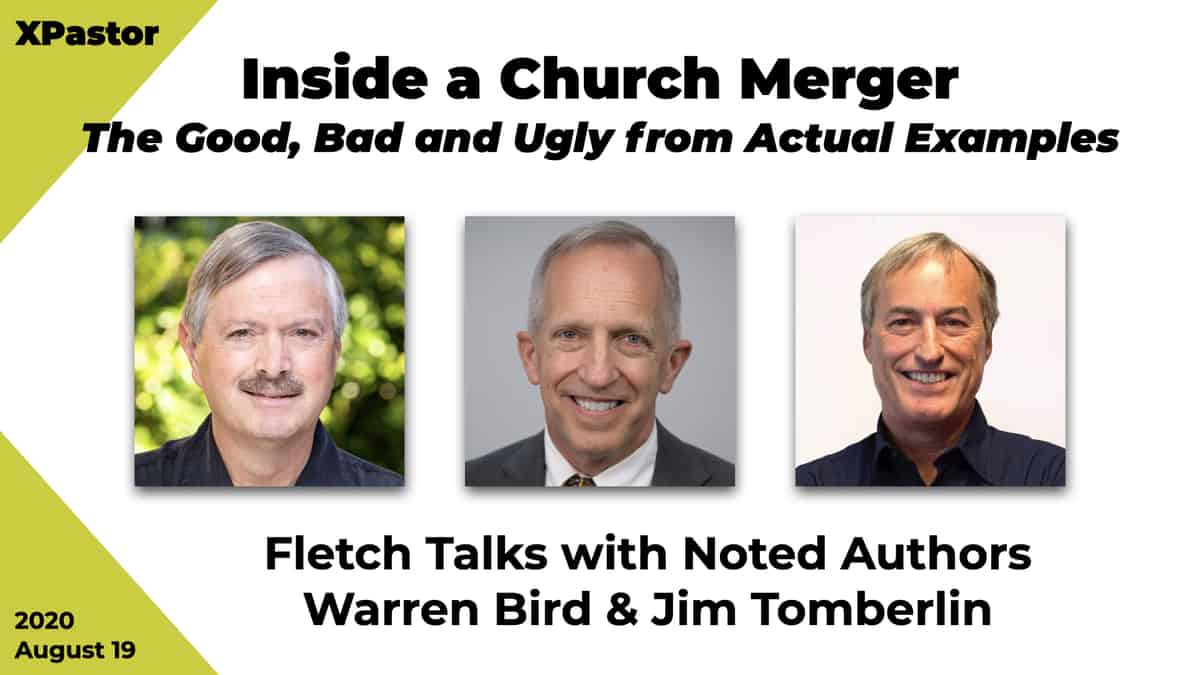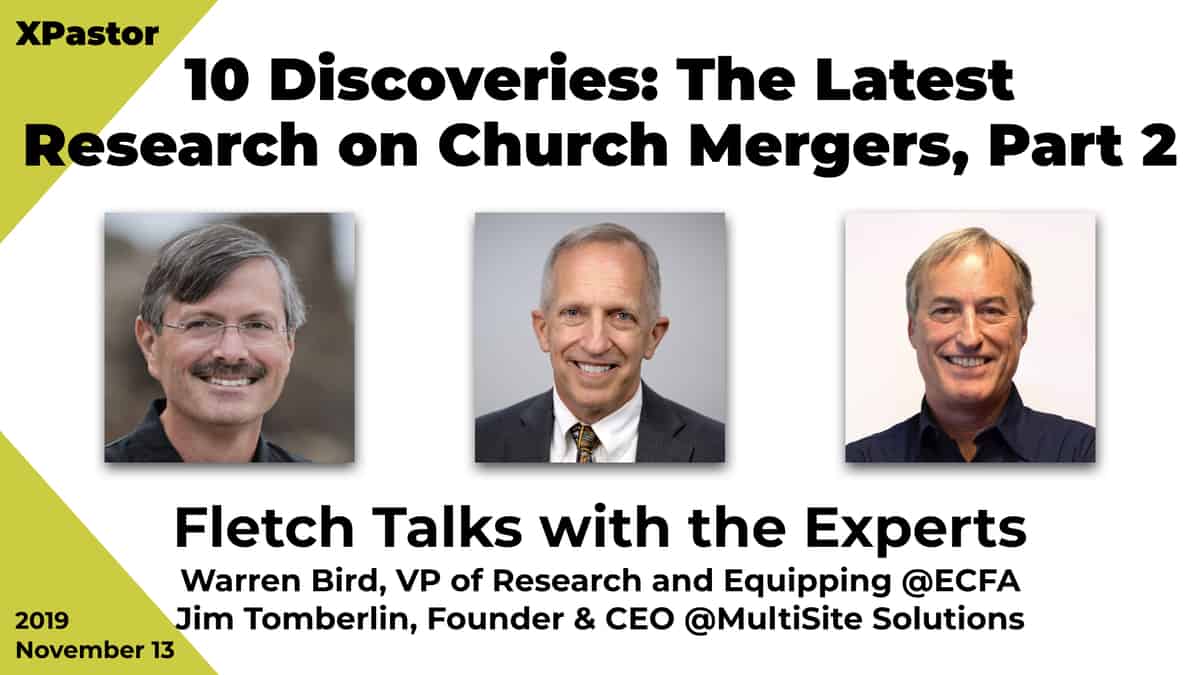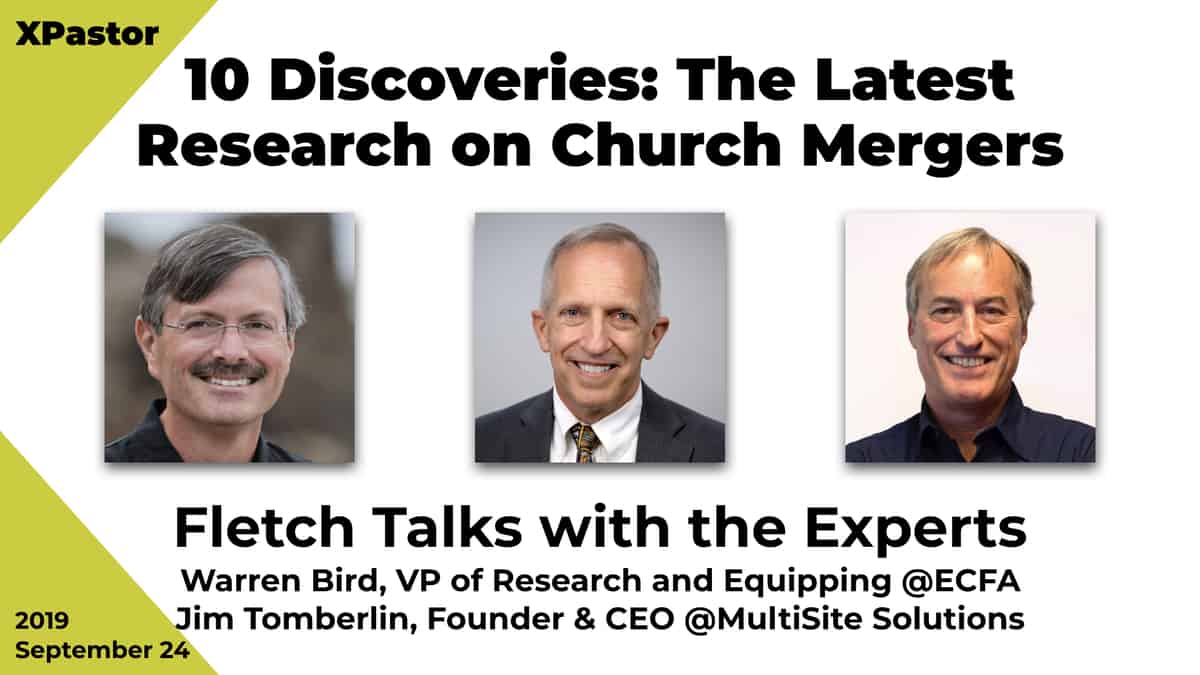Several years ago, I stood in the back of our newest campus during the campus’s first baptism service. This campus was a merger with a 15-year-old church that had lost its evangelistic effectiveness. An older lady came up to me as a man in his 30s was being baptized, tugged on my shirt, and with tears in her eyes, said, Pastor Eric, this … this is what we had been praying and longing for years—life change!
Fast forward to a recent merger here in Nashville. During the merger process, again an older woman, probably in her 80s, came up to me after a gathering and shared, I have to admit that I used to get frustrated and a little angry with the noise in the hallways from all of the kids years ago. Now, I get frustrated and angry with myself that I felt that way. I would do anything to hear the sounds of those children again. A once thriving church had lost its evangelistic effectiveness and was down to less than a hundred people. The majority of those were well into their senior years.
There is something amazing that happens in a healthy, purposeful, and flourishing church merger. After being in ministry for 35 years, I can say that the mergers I’ve been a part of are some of my fondest ministry memories. We serve a God of second chances, don’t we? We serve a God of but-ology, right? I once was lost, but now I’m found! Churches are closing at a record pace and far outnumbering churches that are opening. Those closing churches are becoming apartments, restaurants, parking lots … the list goes on. Where years before committed Christ-followers had sacrificed their savings and retirement accounts for a Gospel proclamation center are now becoming shopping centers. Why? They weren’t being given a second chance. They weren’t allowed to be found from their lost paths. Churches losing their way may have been the problem, but a church merger could have been the answer!
Church Leader, let me present you with three things to know and three things to do to produce a successful, healthy, and flourishing church merger.
3 Key Things to Know
1. A Church Merger Brings in Good People
Remember the old hands together finger game that ends with open up the church door and see all of the people? That’s what church is—the people. Now people can be difficult. I have been known to say once or twice that ministry would be a lot easier if it wasn’t for the people. But, each time I repent and move ahead—haha. In all reality, it is the people that God brings together that make an awesome church!
When you merge with another church, one of the true joys is the people. There are typically four categories of people in a church merger. The first is Ready for Change Randy. Randy has seen the good and bad of his church’s life cycles and is ready to do whatever it takes to reach people for Christ. Ready for Change Randy is ready and will be ready to help in whatever way possible to see lives changed for Christ.
The second type of person in a church merger is Glass Half Empty Gabriella. Gabriella is the type of person who finds problems in any situation or circumstance. If there’s a negative angle to your situation, Gabriella will find it. When it comes to church mergers, there are a lot of unknowns, a lot of trust that is needed to succeed, and a lot of places where Gabriella can cast her doubt.
The third type of person is Along for the Ride Andy. He’s always been in this church and always will. He’s not totally in with all of life but is in his spot every Sunday. Andy will go with the majority and go with the flow because he doesn’t rock the boat and, truth be told, just doesn’t care all that much.
The fourth type of person is Studious Sarah. Sarah will not just take your presentation hook, line, and sinker. Sarah will need to ask questions, wrestle with topics, and get to know the presenter, not just the presentation. Once Studious Sarah gets the answers she’s looking for, chances are very good she’ll be a huge advocate and influencer. But you can’t rush the process with Studious Sarah.
The great news is that in all of those four categories of merger people, there are awesome individuals who love Jesus and will be huge additions to your ministry.
2. A Church Merger Checks All of the Important Facility Boxes
I started merging with churches 20 years ago. Over the last two decades, unfortunately, it has gotten harder and harder to deal with most towns, cities, and counties. The tax income is becoming more and more important for these municipalities. In addition to that, the zoning for churches seems to have gotten tighter and more difficult. The days of converting an old hardware or grocery store into a storefront church are becoming less accessible.
That’s where a merger comes in. You typically have the correct amount of parking—check. You have the correct zoning for a church—check. You typically have the correct layout and use for a church—check. Often churches are located in good locations for visibility—check. It’s already in a tax-free, non-profit situation—check.
I’ll be honest, there are some real positives to starting a church or campus fresh with a fresh building. But, that’s for point #3 below. But, I can honestly say that the facility benefits of a merger, in my experience, most of the time far outweigh the potential downsides.
3—A Church Merger Isn’t All Unicorns and Butterflies
With all of the blessings and benefits of a church merger, I’d be remiss if I left you thinking that mergers are all unicorns and butterflies. They are a lot of work, emotionally draining, difficult to manage, and not for the faint of heart. Here are four difficult topics:
First, it’s hard for lay leaders and staff to give up their history, future (as the church they were), control, and to welcome change. As much as they might be all for change in theory and in the process, there will inevitably come a time when each leader has wrestlings, frustrations, and more. Multiply that by 20, 50, or 100 leaders, and it becomes a real struggle.
I think of a merger situation where our first conversations led to the place where the senior pastor was all in with the merger. He was so very excited about the possibility of the merger. Unfortunately for him, his elder team was not. They became so at odds with the senior pastor that the senior pastor chided them for not being open to God’s leading and best for their church. Talks with that church ended there at that point.
However, circumstances led to a reigniting of talks six months later. At that point, there was still an impasse. However, it was a complete 180-degree change of positions—now the elder team wanted the merger and the senior pastor did not. Again, leaders of the church being adopted will often ebb and flow between excitement, fear, and even resentment. By the way, we ended up merging with this church, and it is currently more than 20x the size that it was before the merger just a few years ago.
Second, often the facilities are run down. Churches that are dying are typically cash-strapped. They want to keep the lights on, pay their staff, and keep goldfish crackers going for their kids. The problems typically come when maintenance has not been kept up with with their facilities and small, broken things have been left as is. There could often be large older buildings that have major HVAC, plumbing, or electrical issues as well.
Third, that neighborhood probably knows that the current church isn’t doing much for the community. It might have a bad or non-existent presence in the community. One merger we made was of a church that had had four or five different names in the past several years in an effort to rebrand. The problem was that while the name changed, the ministry did not. Creating a new reputation in the community and neighborhood can present a challenge.
Fourth, depending on the denomination, sometimes acquiring the building is a major hassle. It could be that a denomination owns the building or owns rights to the building. It could be that your city, county, or state makes moves like this one difficult. A true merger means that the current church and the adopting one become one organization and the history of the adopted church remains intact. However, so do its liabilities as well.
If a sexual assault case pops up later on after the merger, for example, the adopting/leading church will be liable. When the opportunity comes to dissolve and donate as a merger, that typically is cleaner and quicker. However, leaders have to wrestle with their church no longer being in existence legally with the dissolve and donate option. It may seem like semantics, and in large part is, but there is a very real emotional, mental, and even spiritual wrestling that comes with the process.
3 Key Things To Do
1. Approach Your Merger with Compassion
I know of some churches that do regular mergers that probably don’t use quite as much compassion as I would recommend. It’s easy to move into business, acquisition, and vision mode with the merger as it progresses. Those aspects are definitely needed and vital, but as you work through those items, it’s important to remember the situation, commitment, struggle, and spiritual journey that the church you are adopting and their church family are going through.
We recently adopted a church where one of the key church leaders was a baby in the nursery back in the day. At one point, the church was one of the largest in Nashville and the whole Southeast. And now, he was considering another church merger with new pastors, new leadership, and a new name. That is tough. To his credit, there was one more new that kept him going. He wanted to see new lives in Christ and new people in the church being baptized. Those things had long since stopped at this church.
As you go through the merger and exploration process, there are some proven steps that can help churches and church leaders process what the Lord is doing and bring clarity. Virtually all of our mergers have had a 97-100% affirmative vote rate and, I truly believe, they would still have an affirmative vote today because of the care and compassion used during the process.
I would highly recommend seeking out a third-party consultant to help guide and navigate that process if you find yourself in a potential merger—feel free to contact me for ideas.
2—Realize that the Merger is for the Purpose of Reaching the Lost
Luke 19:10 is Jesus’ mission statement: I came to seek and save that which was lost. With all of the struggles you go through with a merger, there are incredible joys and blessings. But through the struggles, it’s important to keep an eye on the prize—expanding the Kingdom. Keeping that vision in front of your to-do’s as well as your leadership team, and ultimately, the church family, is super important.
Statistics show that new churches and new campuses do a great job of reaching people for Jesus. When that first person accepts Christ at the new campus and is baptized, what an exciting time to celebrate the reason for the merger.
This also plays out as the campus develops to ask and answer the question: What will reach this campus’s community for Christ? A central Christmas concert may or may not fit that bill. The kids’ fall fest may need to have a version at each campus—not for quality—but for a greater chance of reaching their community with Christ. Keeping the main thing the main thing is the main thing.
3—Study Other Experts on the Process and plan for Successful Mergers
When I started in multisite ministry 20 years ago, it was a bleeding edge ministry strategy. We learned through bumps and bruises and one-the-job experience until I met my friend, Jim Tomberlin, and he was able to show me some of the ropes. Jim is now the world’s leading expert in multisite and has written, with another friend of mine, Warren Bird, the definitive book on multisite ministry, Better Together.
Reading a book like that helps set perspective and parameters, it shows the history of how God is using this strategy, method, and more. I would suggest reading it and having copies available. I pass them out all the time as we start conversations with pastors and churches.
In addition to reading and studying, there is a coaching element for the leading church and the merging church that is critical. A third party can often be super helpful in moving the merger from an idea to a reality. I encourage you to find someone who can help coach and guide you through this process.
I hope and pray for your merger endeavors, that they will be Godly, healthy, successful, and flourishing! I am blessed to provide that type of coaching regularly and love doing so!



